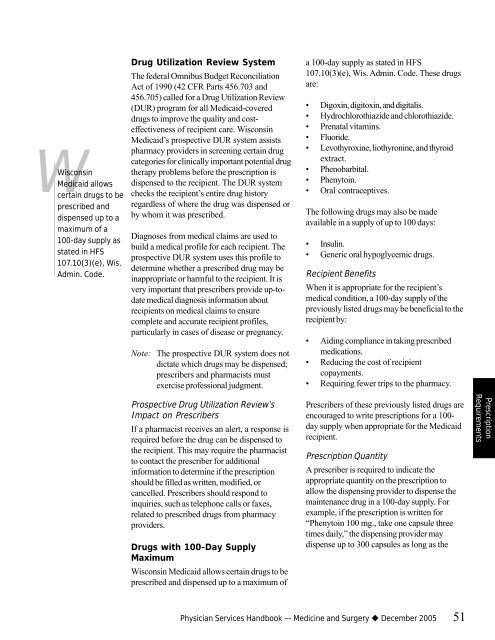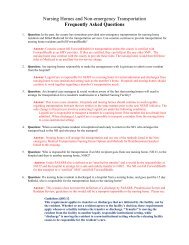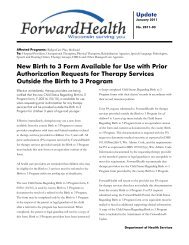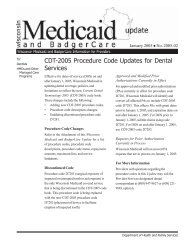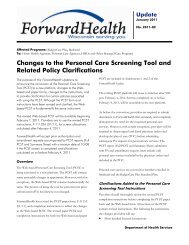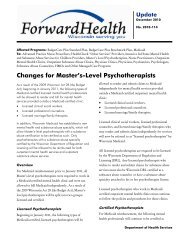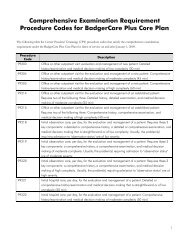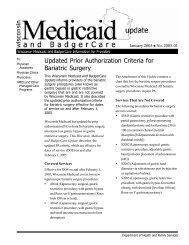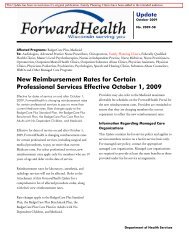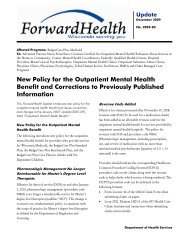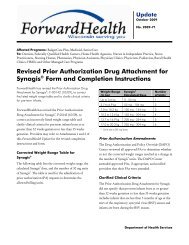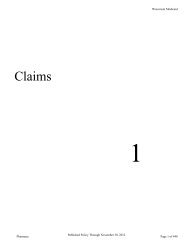Medicine and Surgery Section - Wisconsin.gov
Medicine and Surgery Section - Wisconsin.gov
Medicine and Surgery Section - Wisconsin.gov
Create successful ePaper yourself
Turn your PDF publications into a flip-book with our unique Google optimized e-Paper software.
<strong>Wisconsin</strong><br />
Medicaid allows<br />
certain drugs to be<br />
prescribed <strong>and</strong><br />
dispensed up to a<br />
maximum of a<br />
100-day supply as<br />
stated in HFS<br />
107.10(3)(e), Wis.<br />
Admin. Code.<br />
Drug Utilization Review System<br />
The federal Omnibus Budget Reconciliation<br />
Act of 1990 (42 CFR Parts 456.703 <strong>and</strong><br />
456.705) called for a Drug Utilization Review<br />
(DUR) program for all Medicaid-covered<br />
drugs to improve the quality <strong>and</strong> costeffectiveness<br />
of recipient care. <strong>Wisconsin</strong><br />
Medicaid’s prospective DUR system assists<br />
pharmacy providers in screening certain drug<br />
categories for clinically important potential drug<br />
therapy problems before the prescription is<br />
dispensed to the recipient. The DUR system<br />
checks the recipient’s entire drug history<br />
regardless of where the drug was dispensed or<br />
by whom it was prescribed.<br />
Diagnoses from medical claims are used to<br />
build a medical profile for each recipient. The<br />
prospective DUR system uses this profile to<br />
determine whether a prescribed drug may be<br />
inappropriate or harmful to the recipient. It is<br />
very important that prescribers provide up-todate<br />
medical diagnosis information about<br />
recipients on medical claims to ensure<br />
complete <strong>and</strong> accurate recipient profiles,<br />
particularly in cases of disease or pregnancy.<br />
Note: The prospective DUR system does not<br />
dictate which drugs may be dispensed;<br />
prescribers <strong>and</strong> pharmacists must<br />
exercise professional judgment.<br />
Prospective Drug Utilization Review’s<br />
Impact on Prescribers<br />
If a pharmacist receives an alert, a response is<br />
required before the drug can be dispensed to<br />
the recipient. This may require the pharmacist<br />
to contact the prescriber for additional<br />
information to determine if the prescription<br />
should be filled as written, modified, or<br />
cancelled. Prescribers should respond to<br />
inquiries, such as telephone calls or faxes,<br />
related to prescribed drugs from pharmacy<br />
providers.<br />
Drugs with 100-Day Supply<br />
Maximum<br />
<strong>Wisconsin</strong> Medicaid allows certain drugs to be<br />
prescribed <strong>and</strong> dispensed up to a maximum of<br />
a 100-day supply as stated in HFS<br />
107.10(3)(e), Wis. Admin. Code. These drugs<br />
are:<br />
• Digoxin, digitoxin, <strong>and</strong> digitalis.<br />
• Hydrochlorothiazide <strong>and</strong> chlorothiazide.<br />
• Prenatal vitamins.<br />
• Fluoride.<br />
• Levothyroxine, liothyronine, <strong>and</strong> thyroid<br />
extract.<br />
• Phenobarbital.<br />
• Phenytoin.<br />
• Oral contraceptives.<br />
The following drugs may also be made<br />
available in a supply of up to 100 days:<br />
• Insulin.<br />
• Generic oral hypoglycemic drugs.<br />
Recipient Benefits<br />
When it is appropriate for the recipient’s<br />
medical condition, a 100-day supply of the<br />
previously listed drugs may be beneficial to the<br />
recipient by:<br />
• Aiding compliance in taking prescribed<br />
medications.<br />
• Reducing the cost of recipient<br />
copayments.<br />
• Requiring fewer trips to the pharmacy.<br />
Prescribers of these previously listed drugs are<br />
encouraged to write prescriptions for a 100day<br />
supply when appropriate for the Medicaid<br />
recipient.<br />
Prescription Quantity<br />
A prescriber is required to indicate the<br />
appropriate quantity on the prescription to<br />
allow the dispensing provider to dispense the<br />
maintenance drug in a 100-day supply. For<br />
example, if the prescription is written for<br />
“Phenytoin 100 mg., take one capsule three<br />
times daily,” the dispensing provider may<br />
dispense up to 300 capsules as long as the<br />
Physician Services H<strong>and</strong>book — <strong>Medicine</strong> <strong>and</strong> <strong>Surgery</strong> December 2005 51<br />
Prescription<br />
Requirements


